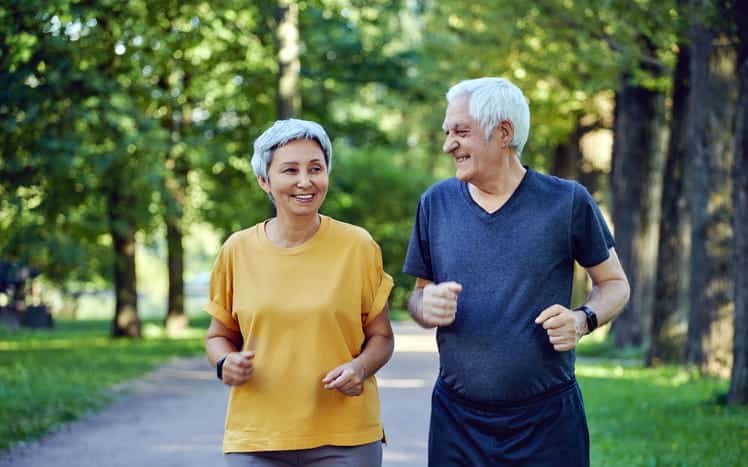When we think of exercise, the usual thoughts that come to mind are bodybuilders, the gym, toned, picture-perfect men and women on the cover of magazines, etc. What we don’t think of is its positive impact on elderly health.

Regular exercise plays a vital role in promoting the health and well-being of older adults. Research has proven time and time again that elderly exercise is associated with immeasurable health benefits, including decreased cardiovascular mortality, improved strength, balance, energy levels, and improved mental health. The positive impact on cognitive function and mood makes exercise an essential component of healthy aging, making the importance of elderly exercise indisputable.
Contact Haven Health’s skilled nursing facility!
What Role Does Exercise Play in the Elderly?
The role of exercise plays a crucial impact on several factors related to aging and the elderly population, such as:
- Aids in maintaining the ability to live independently
- Reduces risk of falls, fractures, and physical decline
- Helps improve stamina and muscle strength
- Reduces symptoms related to anxiety and depression
- Helps maintain healthy bones, muscles, and joints
- Helps control joint swelling and pain associated with arthritis
- Reduces the risk of cardiovascular and metabolic diseases
- Reduces the risk of osteoporosis
- Helps with reducing the risk and managing diabetes
Related: Summer Heat Safety Tips for Seniors
What Is the Impact of Physical Activity on the Elderly?
In addition to the factors stated above, physical activity for the elderly also fosters better sleep and reduced anxiety. A mix of aerobic, muscle-strengthening, and balance activities will help keep bones and muscles strong and aid in managing chronic disease. Thirty minutes of moderate-intensity physical activity five days a week is recommended to strengthen the heart, lungs, and muscles. The impact of physical activity on the elderly is priceless. The most significant is the reduced risk of falls.
What Is the Importance of the Elderly Being Active?
Engaging in physical activity is of paramount importance for the health and well-being of older adults. Exercise offers numerous benefits that can significantly enhance the lives of seniors. Beyond the physical and cognitive benefits, physical activity provides seniors the opportunity for social engagement. Many group fitness classes or outdoor activities centered around physical activity offer vital connections and a sense of purpose. By embracing regular physical activity, older adults can experience a significant improvement in their overall quality of life, once again making exercise an essential component of healthy aging.
Learn how Haven Health’s nursing facility promotes physical activity in seniors!
What Are the Best Types of Exercise for the Elderly Population?
The CDC recommends that adults aged 65 and older need a minimum of 150 minutes a week of moderate-intensity physical activity or 75 minutes a week of vigorous-intensity physical activity. In addition, two days a week of muscle-strengthening activities and activities that improve balance.
Moderate-intensity activities:
- Brisk walking
- Water aerobics
- Bicycle riding
- Dancing for fitness
- Hiking
Vigorous-intensity activities:
- Running
- Aerobics
- Swimming
- Hiking uphill
- Martial arts
Muscle-strengthening activities:
- Yoga
- Pilates
- Tai Chi
- Weight lifting
- Resistance bands
- Pushups
- Sit-ups
There are many ways to incorporate physical activity into any daily routine, no matter how busy. The benefits of exercise in seniors have benefits that far outweigh the time and effort needed to accomplish. Whether living independently or in an assisted living facility, there are many ways to make exercise a part of your daily routine.
Haven Health facilities make our residents’ health a top priority. We work diligently to create as many opportunities for physical activity available to our residents as possible. From one-on-one to group exercise, we at Haven Health promote the importance of regular physical activity. We strive to foster and maintain independence by every means necessary, and exercise is one of the most effective and easily implemented ways to do just that.
Regular Exercise Is a Powerful Tool

Regular physical activity is undeniably crucial for the health and well-being of older adults. Research has consistently shown that exercise not only improves physical health, such as reducing the risk of chronic diseases and preventing falls, but also enhances mental well-being and cognitive function.
Regular exercise is a powerful tool for maintaining independence and preventing frailty and decline during aging. Exercise should be a priority and a habitual part of daily life for seniors as it offers a life-changing opportunity to promote health, vitality, social connection, and overall quality of life.
References:
Centers for Disease Control. (n.d.). Older Adults.
Centers for Disease Control. (2023). How much physical activity do older adults need?
NIH. (2016). Physical activity in older age: perspectives for healthy aging and frailty.